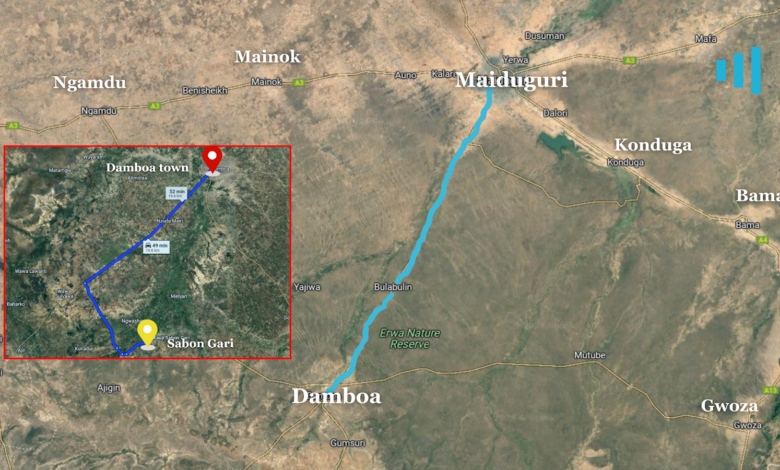Rising Insecurity: Spotlight on the Damboa Tragedy in Nigeria
Soldiers paraded the remains of a terror group member on their windshield, his AK rifle wrapped around his lifeless form. The terror attacks that followed in the area are suspected to be a bold response to this.

The recent attack on a military base in Sabon Gari, a remote village in the Damboa local government area of Borno state, northeastern Nigeria, raises questions about its timing and possible motivations.
The region has, for over a decade, been plagued by the violent activities of the Boko Haram terror group and its splinter groups.
The attack on Saturday, Jan. 4, which occurred shortly after the Nigerian military intercepted and killed a high-profile member of the Islamic State West Africa Province (ISWAP), appears to be a calculated retaliation by the insurgents. Local and military sources provide chilling details of the incident, painting a picture of escalating tension between the two forces.
Damboa, which hosts thousands of displaced families, is still under heavy military protection as a result of persistent pockets of violent attacks. The road to Damboa from Maiduguri, about 89 km distance, has been closed for years as the area remains volatile.
Only the military and members of the civilian joint task forces can access the road every day. Civilians and commercial vehicles can only access the road twice weekly with strict military inspections and escort.
In a brave operation in December 2024, the Nigerian military intercepted three ISWAP members, suspected to be of high-ranking profile, along the Maiduguri-Damboa road. One of the insurgents was killed, while the others managed to escape.
The soldiers paraded his body on their windshield, his AK rifle wrapped around his lifeless form. However, this act may have provoked a bold response from ISWAP.
Within the same week, members of the Civilian Joint Task Force (CJTF) were ambushed, and a military convoy also came under attack. The proximity of these incidents in both time and location suggests a coordinated effort by ISWAP to strike back at the security forces. Since then, several attacks on local farmers and civilian and military convoys have also been launched by the insurgents in Damboa.
The attack on the military base in Sabon Gari on Saturday, Jan. 4, was the culmination of this chain of events. Heavily armed insurgents stormed the base, leading to a deadly encounter.
Major Gen. Edward Buba, the Nigerian military’s spokesperson, in a press statement, confirmed the motivation for the attack launched by the terror group.
“Mr Buba said the terrorist had attempted to surprise the troops to retaliate for the recent killing of their commander and combatants by the troops,” local media reported.
According to the statement, military vehicles were destroyed, and six soldiers were killed. The fierce battle led to the killing of 34 insurgents, and several ammunition and weapons were recovered from them by the Nigerian Army.
Following the devastating terrorist attack on the military base in Sabon Gari, President Bola Ahmed Tinubu expressed sympathy and solidarity with the armed forces and the families of the personnel who lost their lives in the incident.
In the aftermath of the attack, President Tinubu called for a thorough investigation to uncover the circumstances surrounding the incident. He emphasised that understanding the factors that led to the tragic loss is crucial to preventing such occurrences in the future.
In a statement issued by Bayo Onanuga, the special adviser to the president on information and strategy, the president conveyed his heartfelt condolences to the families. He assured them their loved ones’ sacrifices would never be forgotten, reaffirming the nation’s gratitude for their dedication and courage.
“This tragic loss of our gallant soldiers is a sobering reminder of the challenges we face in securing our nation. We owe it to their memory to continue the fight against terrorism and ensure that Nigeria remains a united and peaceful country,” the president said.
He also appealed to Nigerians and the media to stand in solidarity with the military by supporting their efforts to restore peace and stability across the nation.
A recent attack on a military base in Sabon Gari, Damboa, in northeast Nigeria, linked to the Boko Haram splinter group, ISWAP, highlights ongoing tensions in the region plagued by terrorism for over a decade.
The attack, seen as retaliation by ISWAP, occurred after Nigerian military forces intercepted and killed a high-profile ISWAP member, leading to ambushes on the military and joint task forces.
The assault resulted in the death of six soldiers and 34 insurgents, with military vehicles destroyed.
In response, President Bola Ahmed Tinubu expressed sympathy for the armed forces and the families of the deceased, urging a thorough investigation into the incident to prevent future occurrences.
He emphasized the importance of continued support for military efforts against terrorism and called for national solidarity to maintain peace and stability in Nigeria.
Support Our Journalism
There are millions of ordinary people affected by conflict in Africa whose stories are missing in the mainstream media. HumAngle is determined to tell those challenging and under-reported stories, hoping that the people impacted by these conflicts will find the safety and security they deserve.
To ensure that we continue to provide public service coverage, we have a small favour to ask you. We want you to be part of our journalistic endeavour by contributing a token to us.
Your donation will further promote a robust, free, and independent media.
Donate HereStay Closer To The Stories That Matter




